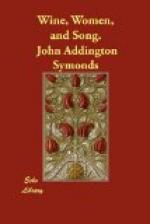In these respects it detaches itself from the artistic and literary phenomena of the century which gave it birth. In these respects it anticipates the real eventual Renaissance.
There are, indeed, points of contact between the Students’ Songs and other products of the Middle Ages. Scholastic quibblings upon words; reiterated commonplaces about spring; the brutal contempt for villeins; the frequent employment of hymn-rhythms and preoccupation with liturgical phrases—these show that the Wandering Scholars were creatures of their age. But the qualities which this lyrical literature shares with that of the court, the temple, or the schools are mainly superficial; whereas the vital inspiration, the specific flavour, which render it noteworthy, are distinct and self-evolved. It is a premature, an unconscious effort made by a limited class to achieve per saltum what was slowly and laboriously wrought out by whole nations in the fifteenth and sixteenth centuries. Too precocious, too complete within too narrow limits, it was doomed to sterility. Not the least singular fact about it is that though the Carmina Vagorum continued to be appreciated, they were neither imitated nor developed to any definite extent after the period which I have indicated. They fell still-born upon the unreceptive soil of European culture at that epoch. Yet they foreshadowed the mental and moral attitude which Europe was destined to assume when Italy through humanism gave its tone to the Renaissance.
The Renaissance, in Italy as elsewhere, had far more serious aims and enthusiasms in the direction of science, refined self-culture, discoveries, analysis of man and nature, than have always been ascribed to it. The men of that epoch did more hard work for the world, conferred more sterling benefits on their posterity, than those who study it chiefly from the point of view of art are ready to admit. But the mental atmosphere in which those heroes lived and wrought was one of carelessness with regard to moral duties and religious aspirations, of exuberant delight in pleasure as an object of existence. The glorification of the body and the senses, the repudiation of an ascetic tyranny which had long in theory imposed impossible abstentions on the carnal man, was a marked feature in their conception of the world; and connected with this was a return in no merely superficial spirit to the antique paganism of Greece and Rome.
These characteristics of the Renaissance we find already outlined with surprising definiteness, and at the same time with an almost childlike naivete, a careless, mirth-provoking nonchalance, in the Carmina Vagorum. They remind us of the Italian lyrics which Lorenzo de’ Medici and Poliziano wrote for the Florentine populace; and though in form and artistic intention they differ from the Latin verse of that period, their view of life is not dissimilar to that of a Pontano or a Beccadelli.




